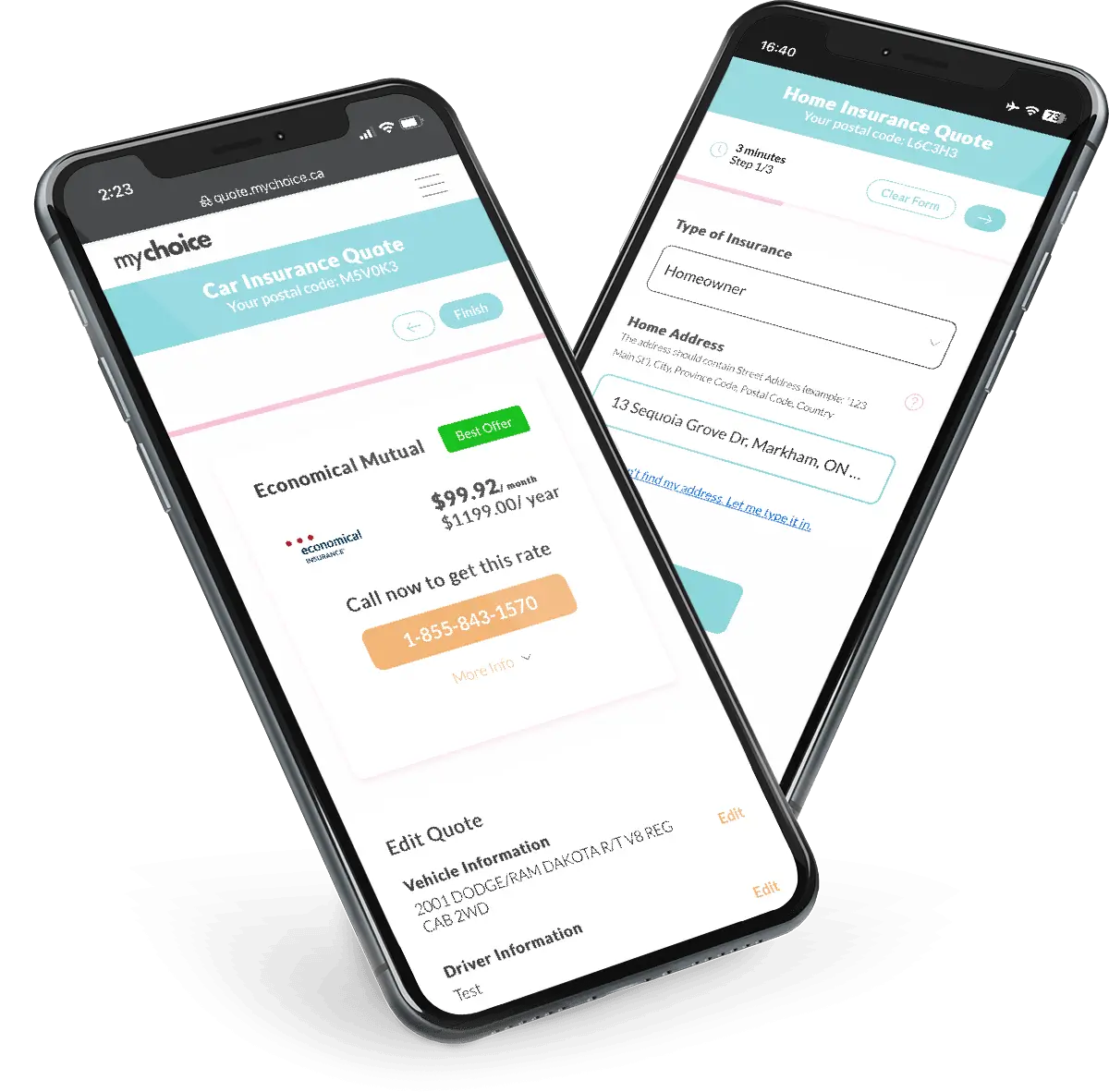Quote data from MyChoice.ca, March 2025
How Can You Get Cheap Car Insurance in Nova Scotia?
The best way to get cheap car insurance in Nova Scotia is to find the lowest-priced policies and reduce your risk profile, landing you more affordable premiums. Here’s how you can find the best insurance policy deals:
How Does Car Insurance Work in Nova Scotia?
Car insurance in Nova Scotia works like most other provinces, where the insurer will provide a certain amount of money in case of an auto accident. Auto insurance is mandatory for all drivers in Nova Scotia, so you must have an insurance policy to drive legally.
Getting caught driving without insurance means the Registry of Motor Vehicles will suspend your driving privileges. To drive again, you need to get insured and pay all fines. The first offence fine is $1,250, but repeat offenders can be charged up to $5,850.
How Your Car Insurance Quotes Are Calculated in Nova Scotia
Nova Scotian insurers use several factors to calculate your car insurance rates. Here’s a look at what factors influence your Nova Scotia auto insurance rates:
Most Expensive Cities to Insure a Car in Nova Scotia
The average annual car insurance rate in Nova Scotia is $821 making it the fourth-cheapest province in the nation. However, some areas of the province can be more expensive than others. The two most expensive cities for car insurance in Nova Scotia are Cape Breton at $1,198/year and Halifax at $1,101/year.
Here’s a detailed look at the most expensive cities for car insurance in Nova Scotia:
| City | Average car insurance rate |
|---|---|
| Cape Breton | $1,198 |
| Halifax | $1,101 |
| Truro, Amherst | $1,043 |
Quote data from MyChoice.ca, March 2025
Least Expensive Cities to Insure a Car in Nova Scotia
Fortunately, Nova Scotia also has several cheap cities for car insurance. Here’s a look at the most affordable cities for car insurance in Nova Scotia:
| City | Average car insurance rate |
|---|---|
| Mahone Bay | $614 |
| Lunenburg | $620 |
| Liverpool | $630 |
Quote data from MyChoice.ca, March 2025
Car Insurance Cost in Nova Scotia by Age
Nova Scotia auto insurance premiums fluctuate depending on your age. People under 25 usually pay more for insurance due to their inexperience. Similarly, people over 65 also pay more premiums because their accident risk increases.
Here’s a look at car insurance premiums in Nova Scotia by age:
| Age group | Average cost | Annual savings with MyChoice |
|---|---|---|
| 18-20 | $2,930 | $583 |
| 21-24 | $1,674 | $332 |
| 25-34 | $1,116 | $221 |
| 35-44 | $821 | $163 |
| 45-54 | $673 | $133 |
| 55-64 | $572 | $113 |
| 65+ | $652 | $129 |
Quote data from MyChoice.ca, March 2025
Car Insurance for Specific Demographics in Nova Scotia
All drivers in the province must have auto insurance to drive legally, with no exceptions. However, you may be wondering whether certain demographics get discounts or special treatment.
Here are some tips to get the best car insurance deals as members of certain demographics:
Car Insurance Cost in Nova Scotia by Driving History
Insurers check your driving history to determine auto insurance rates to predict future driving behaviour. Having traffic violations on your record may make them think you’re a high-risk driver and charge you accordingly.
Depending on the severity and frequency of your traffic violations, you can pay many times over the average Nova Scotia auto insurance rate as a bad driver. Here’s a quick look at how a bad driving record influences your auto insurance premiums:
| Driving violation | Average annual car insurance rate |
|---|---|
| Clean driving record | $821 |
| Insurance cancellation due to non-payment | $1,346 |
| Licence suspension for alcohol-related offences | $985 |
| One accident | $1,806 |
| Speeding ticket | $1,067 |
Quote data from MyChoice.ca, March 2025
Other Factors That Affect Car Insurance Prices in Nova Scotia
Insurers calculate your auto insurance rates based on many factors. Here are some additional things that could influence your Nova Scotia car insurance rates:
Main Mode of Commuting in Nova Scotia
Similar to most provinces, personal vehicles are the most popular mode of commuting in Nova Scotia. However, public transit isn’t as popular in Nova Scotia since its users only represent 4.1% of the province’s total commuters. The second-most popular mode of commuting in Nova Scotia is instead walking, which stands at 5.6%. Here’s a detailed look at how people commute in Nova Scotia:
| Main mode of commuting | Counts | Rates |
|---|---|---|
| Total – 25% Sample Size | 336,015 | 100.0 |
| Car, truck or van | 293,665 | 87.4% |
| Car, truck or van – as a driver | 267,755 | 79.7% |
| Car, truck or van – as a passenger | 25,910 | 7.7% |
| Public transit | 13,895 | 4.1% |
| Walked | 18,975 | 5.6% |
| Bicycle | 1,605 | 0.5% |
| Other method | 7,810 | 2.3% |
Commuting Duration in Nova Scotia
Commuting times in Nova Scotia are usually short, with around three-quarters of the province’s commuters spending under half an hour getting to work. Commutes of over 45 are rare, representing about 9% of the province’s commuters. Here’s a detailed look at the commuting duration in Nova Scotia:
| Commuting duration | Counts | Rates |
|---|---|---|
| Total – 25% Sample Size | 336,015 | 100.0 |
| Less than 15 minutes | 128,938 | 38.4% |
| 15 to 29 minutes | 123,315 | 36.7% |
| 30 to 44 minutes | 51,690 | 15.4% |
| 45 to 59 minutes | 15,840 | 4.7% |
| 60 minutes and over | 16,230 | 4.8% |
Who Provides Car Insurance Quotes in Nova Scotia?
Insurance brokers, agents, aggregators, and direct writers provide car insurance quotes in Nova Scotia. While they all offer auto insurance, they specialize in different things. Here’s a quick look at each insurance provider type:
The Most Common Questions About Car Insurance in Nova Scotia
Are Nova Scotia-filed auto insurance policies in the public record?
Nova Scotia-filed auto insurance policies aren’t in the public record. However, certain authorities like insurers and the police can check your auto insurance policy on their database.
Are police vehicles exempt from insurance laws in Nova Scotia?
We can assume police vehicles are exempt from insurance laws in Nova Scotia because the Motor Vehicles Act doesn’t require them to have insurance.
Are winter tires mandatory in Nova Scotia?
Using winter tires in Nova Scotia is recommended by government officials but not required by law.
Can I register a vehicle in Nova Scotia without insurance?
No, you can’t register a vehicle in Nova Scotia without insurance because you need a policy to legally register a vehicle.
Can parking tickets affect your insurance in Nova Scotia?
Parking tickets don’t affect your insurance in Nova Scotia, but traffic tickets do. Insurers generally search for proof of moving traffic violations as part of their premium calculation process.
Can you get temporary car insurance in Nova Scotia?
You can’t get temporary car insurance in Nova Scotia – the shortest policy you’ll find is a six-month policy.
Do you need insurance before registering a car in Nova Scotia?
You need insurance before registering a car in Nova Scotia because it’s one of the required documents.
Does age affect your car insurance in Nova Scotia, Canada?
Age does affect your car insurance in Nova Scotia, Canada. Generally, you’ll receive high rates as a teen until you hit 25. Then, your rates will decline every year until you reach 65 years of age, when premiums will rise again.
Does Nova Scotia accept electronic car insurance proof?
Nova Scotia accepts electronic car insurance cards as proof in addition to the traditional pink cards.
How do I file a claim in Nova Scotia?
You can file a car insurance claim in Nova Scotia by contacting your insurer as soon as possible. From there, you need to follow their instructions to ensure your claims process is completed successfully.
How long do driving offences or accidents last on my driving record in Nova Scotia?
In Nova Scotia, driving offences or accidents last about two years on your driving record.
Is driving without car insurance a criminal offence in Nova Scotia?
Driving without car insurance isn’t a criminal offence in Nova Scotia. However, getting caught driving without car insurance will result in penalties and fines.
Is Nova Scotia car insurance no-fault?
Nova Scotia car insurance runs on a no-fault system, meaning your insurer is responsible for covering your vehicle damage regardless of who’s at fault.
Is there a tax on car insurance in Nova Scotia?
Per the Insurance Act of Nova Scotia, there is a tax on car insurance in the province.
How do I get a car insurance pink slip in Nova Scotia?
You can get a copy of your car insurance pink slip in Nova Scotia by requesting one from your insurance provider.
Who regulates Nova Scotia auto insurance?
Auto insurance in Nova Scotia is regulated by the Nova Scotia Insurance Review Board (NSIRB), which monitors insurers, ensuring their compliance with the Insurance Act.
Who will insure a modified car in Nova Scotia?
Almost all insurers can insure a modified car in Nova Scotia. However, your modifications must be legal, and you must inform the insurer beforehand.
Why is car insurance so cheap in Nova Scotia?
Nova Scotia car insurance is cheap because of government reforms in 2003 that reduced insurance rates by 27% in the entire province.



















